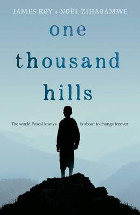One thousand hills by James Roy and Noel Zihabamwe

Omnibus Books, 2016. ISBN 9781742990750
(Age: 15- Adult) Themes: Genocide; Historical events - Rwanda;
Innocence; Discrimination; Children in a time of conflict; Refugees;
Family. Knowing the ultimate outcome of the Rwandan Genocide in 1994
creates an underlying tension throughout the reading of this book.
This narrative is essentially a counselling session - but it is also
a horrible and slowly unfolding catastrophe. The young man, Pascal,
retells his experience to a school counsellor in explanation for an
incident that he was involved in at school. Slowly and painfully he
reveals the events of his life at the time of the genocide and his
survival after the incredible unspeakable tragedy. Should it remain
unspoken? Or does speaking it out loud release the tension or bring
it to mind again? For the reader, it is important to know how tragic
this experience was for the people involved, and the innocent voice
of the young Pascal, as his 10 year old self, creates added anguish.
The boy comes from a mixed tribe family (both Hutu and Tutsi) and
small snippets of the civil unrest filter to him through scattered
threads of conversation until the events of the massacre impact
violently into his normally gentle and religious family. The author
slowly takes us on the journey from the tender and normal family
life of the Rwandan family, with its normal sibling rivalries and
chores, to the final explosive scenes of betrayal and genocide. In a
manner similar to The Boy in Striped Pyjamas by John Boyne,
the innocent voice of the central character magnifies the horror of
the atrocities inflicted.
This is an extremely moving, but atrocious story. And it is an
account of the reality of experience for co-author Noel Zihabamwe.
This is a compelling narrative, but I would be loath to put this
into the hands of a reader too young to understand this part of
history or one who is vulnerable to violence or is traumatised by
news accounts of bloody conflict. The added horror of the
involvement of some from the church in assisting in the tragedy will
also be difficult for some readers. How humans can be so cruel to
one another and lose sight of their common humanity is a huge
unspoken question from the young Pascal. Even though this is written
in a simple and 'youthful' style it is suited for mature readers
aged 15+ and adult readers.
Carolyn Hull